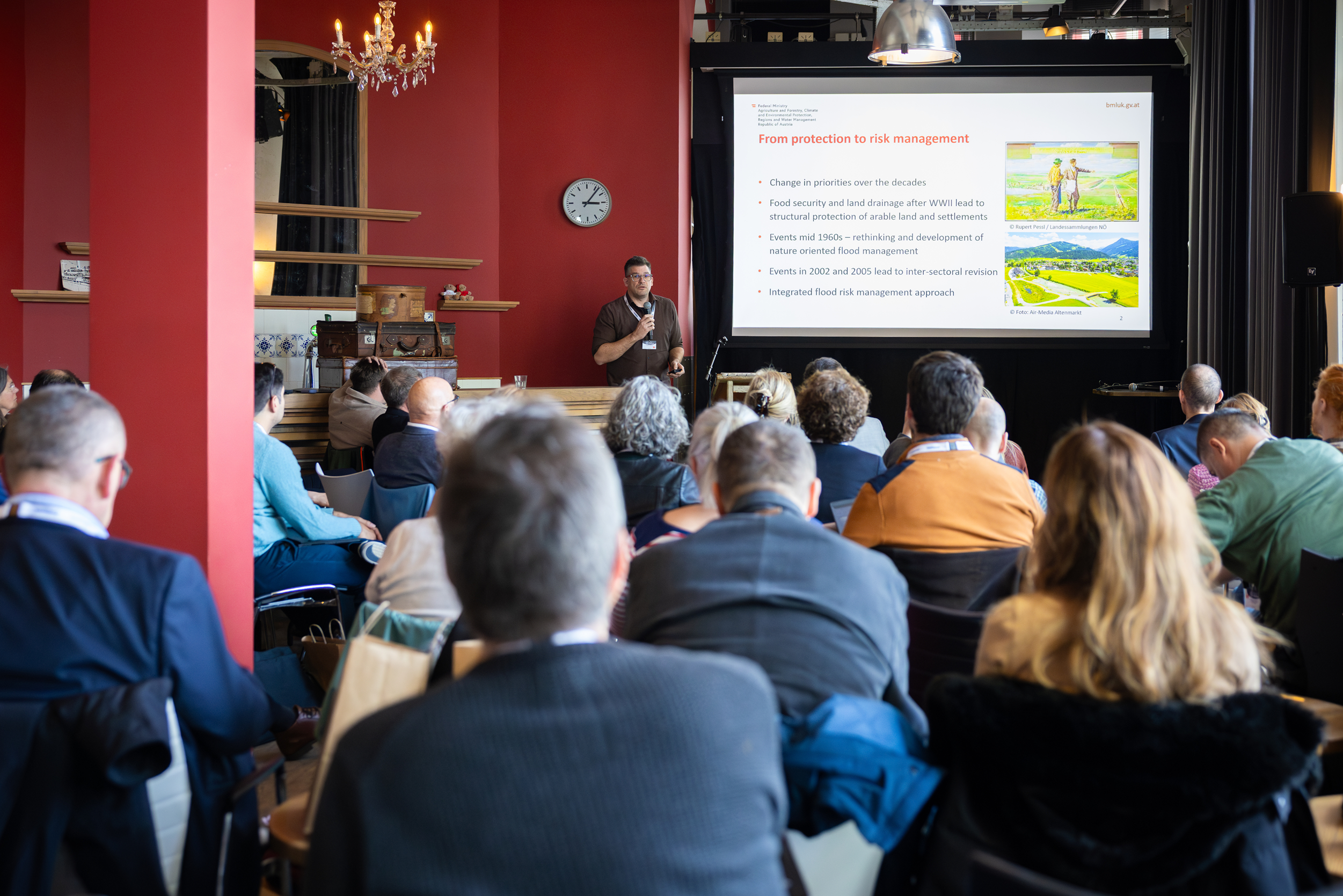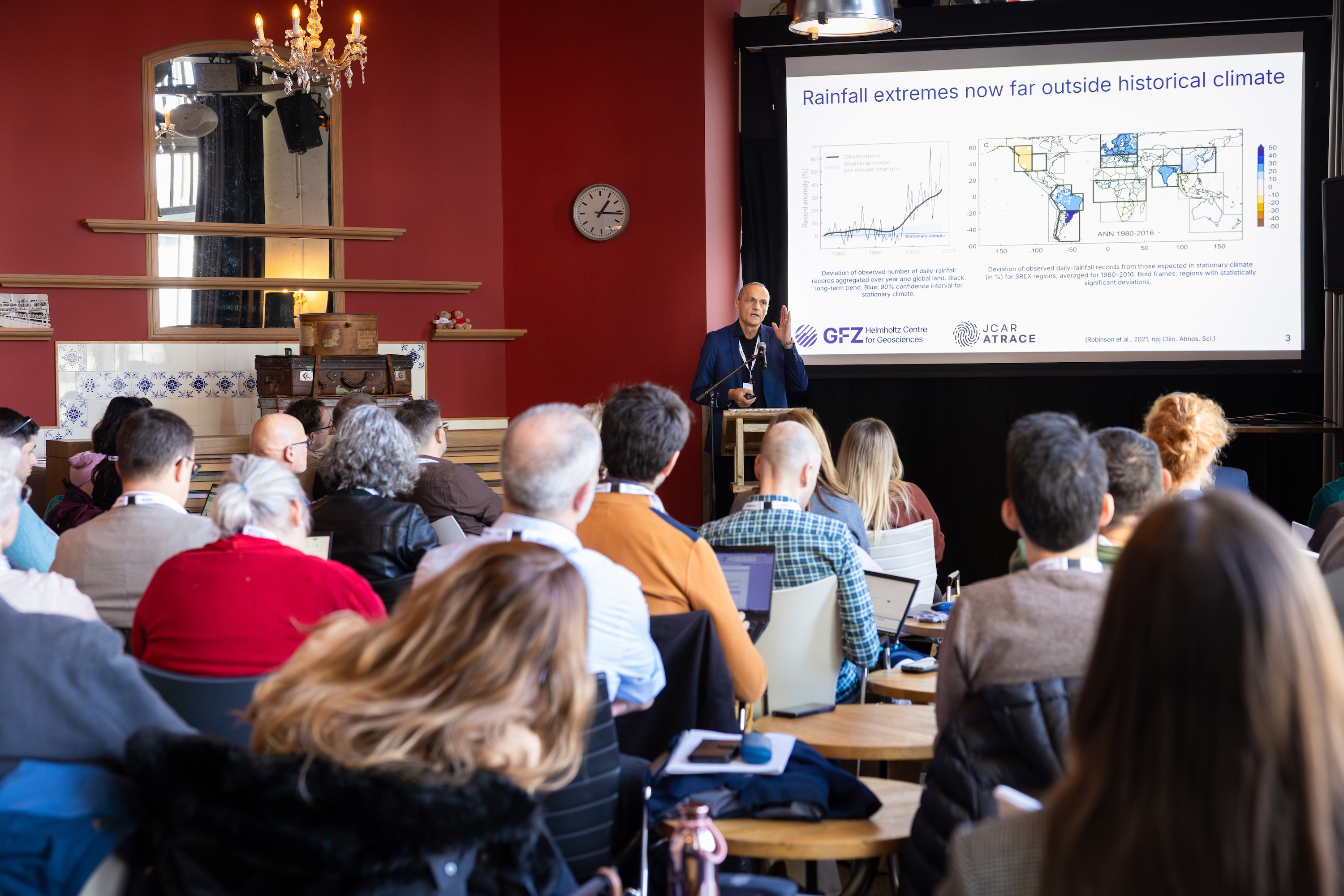
Workshop
Strengthening Europe’s resilience to extreme flood events
JCAR ATRACE workshop with members of the EU Working Group on Floods
Over the past decade, European member states have repeatedly experienced extreme rainfall on an unprecedented scale, leading to severe floods with far-reaching societal impacts. A recent inventory compiled on information from the Emergency Response Coordination Centre (ERCC) of DG ECHO identified at least 13 catastrophic floods across Europe in the past five years, for which the ERCC provided emergency support. In their aftermath, there is often a surge in urgency and interest to learn from these occurrences and to enhance preparedness for future extreme events.
On 9-10 April 2025, over 60 high-level policymakers from Member States convened with JCAR ATRACE researchers for a two half-day workshop, as part of a CIS Working Group on Floods meeting in Rotterdam.
The workshop aimed to evaluate the effectiveness of Europe's management of extreme flood events to date and to assess whether recent floods are driving change and adaptation. Additionally, the group sought to identify what is needed from the European Floods Directive to accelerate the implementation of risk management of extreme floods in particular, in the countries.
Some renowned researchers and experienced policymakers from across the EU were invited to deliver informative presentations. Two breakout sessions allowed for in-depth discussions on important topics: sharing information on national leading flood projects and identifying opportunities and prioritising actions within the implementation of the Floods Directive to more effectively manage the consequences of very extreme floods. The JCAR ATRACE PhD student community also shared their research topics with policymakers through a poster symposium.






In his keynote speech, Prof. Dr. Bruno Merz from GFZ Potsdam highlighted the shortcomings of current flood risk management in dealing with unprecedented floods. Such events, also known as 'black swans', have very high impacts and low probability. He identified three main reasons for these shortcomings and provided direction for possible improvements:
Unique Nature of Extreme Events
These events are not simply larger versions of more frequent floods. To better understand the complex, non-linear dynamics at play, we need to expand our knowledge base by including historical floods and flood process-based model chains.
Cognitive Biases
Both individuals and institutions are often hindered by cognitive biases that prevent them from anticipating or preparing for these extremes. By moving recent known events to the area under consideration and revisiting the question of what would have happened if this rain had fallen there, we could make such extreme events more tangible and understandable.
Broader Societal Implications
The current focus on direct economic losses in risk assessments fails to capture the wider societal impacts of extreme events. By integrating indirect and intangible impacts into these assessments, we can gain a more comprehensive understanding of their significance.
In conclusion, Bruno Merz emphasised that flood risk management must move beyond traditional design events and seriously consider scenarios that may have much lower probabilities but much higher consequences.


Government officials from Norway, France, Austria, and Belgium (Wallonia) shared their valuable insights on their response efforts to recent flood disasters in their countries:
Norway
The Norwegian Water Resources and Energy Directorate (NVE) emphasised the importance of focusing more on prevention for multiple natural hazards. They highlighted the need to invest in expanding the knowledge base regarding the impacts and costs of nature-based solutions.
France
The European Centre for Flood Risk Prevention (CEPRI) advocated for treating recovery as an integral part of preparedness. They stressed the importance of strategic planning for flood control, promoting open dialogue about of homes and economic activities from flood-prone areas, and aligning financial mechanisms in a way that long-term resilience goals can be achieved.
Austria
Despite the flood protection measures functioning as expected in 2024, there was significant damage. The Austrian Ministry (BMLUK) therefore noted the need to address residual risk under changing climatic conditions. It is acknowledged that this will be a challenging but essential task to mitigate future risks.
Belgium (Wallonia)
The public service (SPW) emphasised the need to restore affected banks of the non-navigable rivers in the most resilient manner possible. This approach aims to enhance flood risk prevention and preparedness.
Prof. Dr. Bart van den Hurk, co-chair of IPCC Working Group II on Impacts and a Scientific Director at Deltares, provided an insightful overview of the latest IPCC WG II activities in preparation for the Seventh Assessment Report, scheduled for publication in 2028. He discussed new ideas on guidelines for adaptation and invited workshop participants to contribute practical case studies for the report.
Key Conclusions from the Workshop
Effectiveness of Flood Risk Measures
Over the past decades, countries in Europe have implemented numerous measures to reduce flood risk and mitigate damage from extreme flood events. It is crucial to evaluate and quantify the effectiveness of these measures at a European level. Are we meeting what society expects, and sometimes demands, to what extent are we adapting to climate change? How realistic are our future policy options?
Focus on Flood Recovery and Public Awareness
Recent flood events across Europe have highlighted the importance of flood recovery. It has been identified as a key focus area for the coming years. As experience with this recovery is limited, there is a strong desire to share lessons learned and practical experience between member states in a structured way. Moreover, much more attention should be paid to raising public awareness of flood risks in the coming period.
Accelerating Preparedness Efforts
Despite the progress made, it is clear that we need to accelerate our collective efforts to prepare for extreme flood events. Developing well-established, up-to-date, and easily accessible national flood hazard maps, including real-time data, is essential. Risk maps that take into account potential future developments and focus on impacts to critical infrastructure are vital tools for informing spatial planners, emergency services, and raising public awareness.
We extend our gratitude to the Dutch Ministry of Infrastructure and Water Management, the European Commission, and representatives of other Member States for this unique opportunity to align our research with policy-relevant topics.
JCAR ATRACE researchers will continue to contribute to evaluate and quantify effectiveness of flood risk measures, facilitate knowledge sharing on practical experiences in flood recovery and accelerate preparedness efforts.

Kymo Slager
Senior flood risk expert at Deltares, Programme Manager of JCAR ATRACE
Prof. Dr. Bart van den Hurk, co-chair of IPCC Working Group II on Impacts and a Scientific Director at Deltares, provided an insightful overview of the latest IPCC WG II activities in preparation for the Seventh Assessment Report, scheduled for publication in 2028. He discussed new ideas on guidelines for adaptation and invited workshop participants to contribute practical case studies for the report.
Key Conclusions from the Workshop
Effectiveness of Flood Risk Measures:
Over the past decades, countries in Europe have implemented numerous measures to reduce flood risk and mitigate damage from extreme flood events. It is crucial to evaluate and quantify the effectiveness of these measures at a European level. Are we meeting what society expects, and sometimes demands, to what extent are we adapting to climate change? How realistic are our future policy options?
Focus on Flood Recovery and public awareness:
Recent flood events across Europe have highlighted the importance of flood recovery. It has been identified as a key focus area for the coming years. As experience with this recovery is limited, there is a strong desire to share lessons learned and practical experience between member states in a structured way. Moreover, much more attention should be paid to raising public awareness of flood risks in the coming period.
Accelerating Preparedness Efforts:
Despite the progress made, it is clear that we need to accelerate our collective efforts to prepare for extreme flood events. Developing well-established, up-to-date, and easily accessible national flood hazard maps, including real-time data, is essential. Risk maps that take into account potential future developments and focus on impacts to critical infrastructure are vital tools for informing spatial planners, emergency services, and raising public awareness.
We extend our gratitude to the Dutch Ministry of Infrastructure and Water Management, the European Commission, and representatives of other Member States for this unique opportunity to align our research with policy-relevant topics.

JCAR ATRACE researchers will continue to contribute to evaluate and quantify effectiveness of flood risk measures, facilitate knowledge sharing on practical experiences in flood recovery and accelerate preparedness efforts.